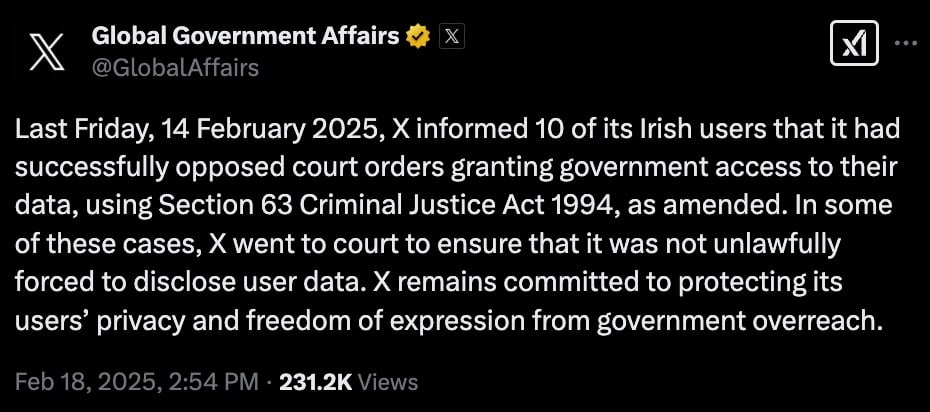In Ireland, the national police and security service, Garda Síochána, failed in its attempts to get X to hand over private messages and the personal details, including IP addresses of every person who had logged into the account of an independent outlet, Gript Media.
The police wanted the data starting from the time in April 2024 when Gript Media published footage of an incident involving Garda officers and members of the public, that happened as a migrant asylum center was being opened in Newtownmountkennedy.
One of the scenes included an officer using force and pepper spraying Gript Media journalist Fatima Gunning.
However, this attempt to enlist X in Garda’s efforts to spy on journalists resulted in the platform successfully challenging it in court.
A post from X’s Global Affairs team said that 10 users in Ireland were informed on February 14 that court orders that sought to give government access to their data were successfully opposed.
Several days later, Gript Media editor John McGurk made a statement to say the demand sent to X was an intolerable and disturbing development and a serious problem that represented an attack on the free press and privacy in Ireland.

McGurk put things in perspective that are similar to what is happening in other countries where police time and resources are wasted on what are ultimately issues involving political speech.
“When you have a police force in a country with a serious problem with increasing levels of crime, especially violent crime, devoting energy and efforts to try and peer into the private messages of the only truly independent and non-state-funded national media platform in their own country, we’ve got a serious problem here,” McGurk said.
He underlined that the nature of the Dublin court orders – issued to X last June – was such that it left the media outlet without the opportunity to mount a legal defense or respond.
Section 62 (Criminal Justice Act 1994) was cited in the order, basing its necessity on what McGurk calls “the very flimsy pretext that we might have some evidence connecting somebody somewhere to that crime.”
That was supposed to be enough to persuade X to allow the authorities access to the journalists’ IP addresses, but also private messages exchanged with readers, sources, and supporters.
McGurk noted that the only reason Gript Media staff know about this is X’s “proactive approach” in informing them.
“It is very telling that when the Irish police were challenged on the legality of their act by X, they backed out,” McGurk said, adding, “They decided not to pursue it, and therefore I’m happy to report that none of our material was handed over to them, nor will it be.”










